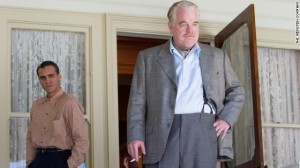The Master
Posted on September 20, 2012 at 5:58 pm
B+| Lowest Recommended Age: | Adult |
| MPAA Rating: | Rated R for sexual content, graphic nudity, and language |
| Profanity: | Extremely strong, explicit, and crude language |
| Alcohol/ Drugs: | Smoking, drinking and drunkenness |
| Date Released to Theaters: | September 21, 2012 |
| Amazon.com ASIN: | B008V0OKGG |
In the sixth movie from virtuoso writer-director P.T. Anderson (“There Will be Blood,” “Boogie Nights”), we see Freddie (Joaquin Phoenix) pause on the dock to look at what seems like the ultimate dream of civilization, a party on board a luxurious yacht filled with light, glamour, elegance, and belonging. He served in the Navy in WWII and his adjustment to civilian life has been troubled. Now, after losing his jobs as a department store portrait photographer and a field worker, with no connection to any thing or person or place or plan and no special skill except for the ability to make very potent alcoholic drinks out of whatever chemicals are at hand, the glow of the party and the people on the ship draws him in with a combination of the exotic and the familiar. He hops over the railing like an experienced sailor and somehow both improbably and inevitably he is taken in by the group and its leader (Philip Seymour Hoffman), called Lancaster Dodd by the authorities but Master by everyone else.
The party is for Dodd’s daughter, who is getting married. The Master himself is performing the ceremony, but more than that, as we will see him do throughout the story, he acts as a full-time master-of ceremonies as much as he is a teacher or leader of what seem to be a perpetual group of rapt followers. He invites Freddie to join them, and to keep making his powerfully intoxicating (and memory-destroying) elixer.
The Master’s acolytes are subjected to a series of private and public interviews, where they are asked to reveal the most intimate details of their lives, and seemingly random and sometimes humiliating tasks. The followers sit in chairs as though they are watching a play as Freddie paces back and forth between the window and the wall, ordered to describe what he sees. The Master, who describes himself as to Freddie as “a writer, a doctor, a nuclear physicist and a theoretical philosopher, but above all, I am a man, a hopelessly inquisitive man, just like you.” Self-aggrandizing, pompously un-pompous, and demonstrably false on its face. If Dodd was in fact inquisitive, he would have noticed that Freddie is not at all inquisitive. He operates entirely on instinct and lives almost entirely in the moment, musing only about his lost love, a 16-year-old neighbor he romantically idealizes though he has not seen or contacted her for years, and about his most animalistic carnal urges. At the group’s evening gathering, he imagines all of the women naked — old, young, even the pregnant wife of the Master (Amy Adams).
It is sumptuously photographed in 70mm (try to see it on the big screen it was shot to fill), and has a jumpy, provocative score by Jonny Greenwood punctuated with retro standards from the American Songbook. Ella Fitzgerald sings “Get Thee Behind Me Satan” as Freddie tries to keep his impulses in check. The performances are breathtaking in their scope, commitment, intelligence, and humanity. The frequent clashes of styles between Phoenix’s nearly feral Method approach, Hoffman’s more thoughtful, structure, and Adams’ iron-willed emotionalism are like timed flares going off to illuminate the story. Freddie is referred to repeatedly as an able-bodied seaman but his body seems anything but able. He is dark, stiff and hunched over, his elbows awkwardly extended back with his hands on his hips as his shoulders bend forward, his mouth twisted to one side when he speaks. Hoffman’s blondness, brilliantly photographed by Mihai Malaimare Jr., makes him seem leonine. He moves like a big, magnificent cat. As in Anderson’s “Boogie Nights,” this is the story of a group of people who create a sort of family. As in his “There Will Be Blood,” it is the story of two men held together by a complicated and sometimes toxic blend of fear, respect, longing, and power. There is a chilliness and remove that keeps the struggle from feeling personal. Perhaps it is a metaphor about post-WWII America, overwhelmed by its own success, audacious, overconfident, careless, and, as ever, struggling between head and heart, past and future, body and soul.
Parents should know that this film has very explicit sexual references and situations, including pornography, very explicit nudity, very strong language, and some disturbing themes.
Family discussion: Why did Dodd want to keep Freddie in the group? What did they have in common? Why was Helen upset by the change from “remember” to “imagine?”
If you like this, try: “Magnolia” and “There Will Be Blood” by the same writer/director
